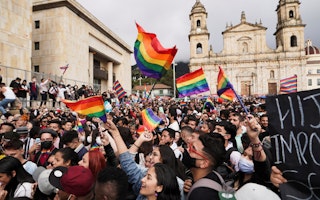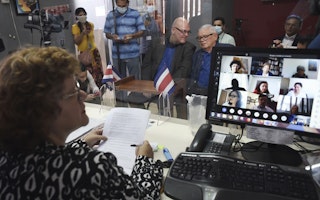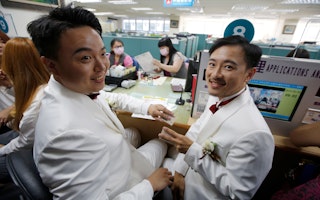After Orlando, the Struggle Against Hate Continues
By Michael Heflin

On Sunday, around the same time that LGBTI rights activists marched peacefully down the streets of Kyiv for their annual pride celebration and half a world away, a lone gunman entered a popular LGBTI nightclub in Orlando, Florida. After reportedly pledging allegiance to the Islamic State, he opened fire, killing at least 49 people and injuring dozens more before being killed by police.
The Kyiv Pride march was the first in that city to be held successfully. Last year’s event had barely started when it was abruptly called off after parade goers were attacked by members of a far-right organization. This year, police preemptively sealed off a 10-block area in the city in response to threats of a “bloody mess.”
Taken together, the events in Kyiv and Orlando demonstrate the horrific hatred and violence LGBTI people continue to face in much of the world today. In many countries, they are criminalized, imprisoned, tortured, and even executed. Even in countries where rights protections exist, LGBTI people are still shunned by family and friends, denied housing and employment, and attacked, both emotionally and physically.
For LGBTI people in the United States, June is a historic month. It marks the anniversary of the 1969 Stonewall Riots and is the month in which many pride festivals take place in cities across the country. Last June, the U.S. Supreme Court ruling in favor of marriage equality provided even more cause for celebration. But as these victories show, even when we succeed in fighting for our rights, we must remain vigilant.
Terrorist attacks and mass shooting are all too common. They come in mind-numbing succession, blurring into each other in the 24/7 news cycle. At a Tel Aviv café last week. The Brussels airport. A social services center in San Bernardino, California. Paris, Beirut—the list goes on. The differences in the victims are less important than what unites them; we are all bound to one another by our humanity. When that humanity is struck down in one place, we are all made more vulnerable.
At times like these, it is even more important to ensure that horrific acts of violence perpetrated by individuals should not be used to fuel Islamophobia. While it is shocking and sad that someone would try to justify this type of hatred with religion, a single act should never be seen to represent an entire faith.
On Sunday night, I attended a vigil for the Orlando victims in front of the White House, where members of the D.C. Gay Men’s Chorus sang “We Shall Overcome” in an impromptu act of solidarity. Speakers expressed their deep sadness at what had happened, emphasizing the need to continue to work to eliminate violence in this country—against LGBTI people, Muslims, and any other marginalized group or minority.
At the Open Society Foundations, it is our mission to create safe spaces around the world where people can come together in spite of their differences, where they can disagree without fear of persecution and advocate for a better world without risking their lives. It is our job to ensure we are not numbed by tragedies like the one that unfolded in Orlando, that instead we rededicate ourselves to the global work of building open societies, even against seemingly insurmountable odds.

Until November 2021, Michael Heflin was the director of equality for the Open Society Human Rights Initiative.


